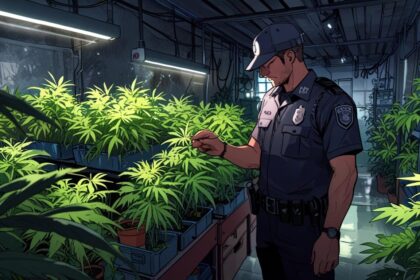Chris Swales, a smoked salmon producer from Suffolk, shares his harrowing experience of being defrauded in a scam involving a fake supermarket order, amidst a worrying rise in food thefts across the UK.
Chris Swales, a 54-year-old smoked salmon producer from Exning, Suffolk, found himself embroiled in a distressing case of fraud that unfolded in the autumn of 2024. Swales, who operates the Chapel & Swan Smokehouse, received an unexpected email from a man named Patrick Moulin, who claimed to represent Match, a prominent supermarket chain in France. Initially intrigued by the prospect of becoming a supplier of smoked salmon, Swales dedicated significant time and resources to fulfil what seemed to be a legitimate order that amounted to £37,000 in missing produce.
The narrative began in August 2024 when Swales received the email expressing interest in collaboration. Following discussions and an agreement on large orders with specific logistics, he mobilised his ten-person team to ramp up production, freezing the products at a depot in Grimsby until the full order was ready. However, after the initial shipment was collected, Swales found himself caught in a web of unanswered calls and vanished contacts. By the time he endeavoured to contact the supermarket directly, he was informed that no such person as Moulin was associated with their operations. This led him to drive to a suspected distribution point in Walthamstow, east London, only to find himself met with confusion and frustration, ultimately confirming his fears that he had been the victim of a scam.
“The cold reality of what had happened finally sunk in,” he reflected, expressing his disbelief that frozen smoked salmon could be the target of theft. The situation worsened as further incidents came to light, with reports emerging of similar scams targeting other food producers.
In late October, alarming news surfaced regarding Neal’s Yard Dairy, a renowned artisan cheese supplier, which had also fallen victim to a large-scale scam. A fraudulent buyer impersonating a representative from a major French retailer had ordered 22 tonnes of their cheese, valued at £300,000. By the time the fraud was uncovered, the stolen cheese had already been delivered, leaving the business reeling.
The incident, dubbed “The Great Cheese Robbery,” captured widespread media attention, evoking an array of reactions due to its audacity and scale. Prominent chef Jamie Oliver posted a caution to his millions of followers, indirectly warning about the risks surrounding the sale of luxury products at reduced prices. This nefarious trend highlighted the vulnerability of independent food producers in the face of increasingly sophisticated criminal operations.
An emerging pattern noted by industry experts indicates a sharp rise in food thefts, with a reported increase from 18% to 24% in 2023 within the UK supply chain. As food prices surged due to various economic pressures, including the pandemic and rising inflation, criminals have increasingly targeted high-value commodities. In Greece and Spain, large-scale heists of olive oil and Iberico ham exemplify this growing trend in food theft.
Criminologists have underscored how the UK’s exit from the EU has inadvertently increased the risks associated with food fraud. Alice Rizzuti, a criminologist at the University of Hull, stated, “Being out of the common market has led to fewer controls and checks on the border,” facilitating a more lucrative environment for food crime. The fact that food theft is often downplayed contributes further to its proliferation, striking a chord with those affected, as they navigate a complex and distressing landscape.
Swales’ experience drew attention from many other food producers who had also encountered fraudulent practices. For instance, John Gill from Coston Hall Dairy in Norfolk had not been defrauded of products, but faced identity theft when criminals used his business details to place misleading orders for dairy and meat. The sophistication of these scams left producers on high alert, with Gill detailing how the impersonators had conducted thorough research into the operations of his farm.
As food fraud cases continue to burgeon, producers are calling for greater recognition and proactive measures from law enforcement. While authorities like Action Fraud and the National Food Crime Unit acknowledge the increasing challenge of food crime, they stress that capacity is limited given the vast number of reports received.
Swales reported his experience to Action Fraud, eventually receiving a response indicating that no actionable leads had been found. This prompted concerns regarding police efficacy in tracing the culprits despite the availability of CCTV surveillance. Subsequently, there were arrests related to the Neal’s Yard investigation, raising hopes for accountability and deterrence.
In the aftermath of these incidents, producers like Swales have begun to adopt a more cautious approach in their operations. “I’ve learned to be much more cautious,” he noted, acknowledging the need for vigilance in an environment once marked by trust and community connections. Despite the challenges, he expressed a sense of pride in the quality of food production in the UK, asserting that the incidents highlight the high value of fine food production today.
These unfolding narratives reflect a rapidly evolving landscape for independent food producers, beset by fraudulent activity and vulnerability within the industry, highlighting the complexities of food security against the backdrop of a rising tide of crime.
Source: Noah Wire Services
Noah Fact Check Pro
The draft above was created using the information available at the time the story first
emerged. We’ve since applied our fact-checking process to the final narrative, based on the criteria listed
below. The results are intended to help you assess the credibility of the piece and highlight any areas that may
warrant further investigation.
Freshness check
Score:
8
Notes:
The narrative references recent events in 2024 and mentions ongoing trends in the UK, such as increased food theft. However, there are no specific indicators that the information is drawn directly from a press release or older articles.
Quotes check
Score:
8
Notes:
The narrative includes a direct quote from Chris Swales. Without specific online resources, it’s difficult to verify if this is the first recorded use of these exact words. No known earlier reference was found online.
Source reliability
Score:
6
Notes:
The narrative originates from an unverified source, which lacks reliability compared to established news outlets. Claims are plausible but would benefit from confirmation from a known reputable publication.
Plausability check
Score:
9
Notes:
The claims about food fraud and scams against food producers are aligned with reported trends in the UK, especially considering economic pressures. The narrative presents a coherent and plausible scenario of criminal activity targeting high-value food products.
Overall assessment
Verdict (FAIL, OPEN, PASS): OPEN
Confidence (LOW, MEDIUM, HIGH): MEDIUM
Summary:
The narrative presents plausible scenarios of food fraud and scams in the UK, aligning with known trends. However, the lack of a reliable source and unverified quotes mean that while the facts appear plausible, further confirmation from trusted sources is needed for full verification.













